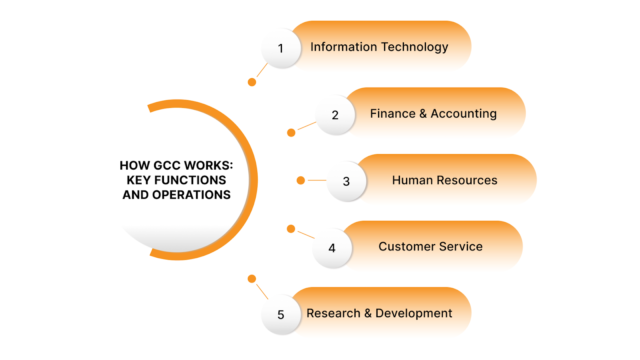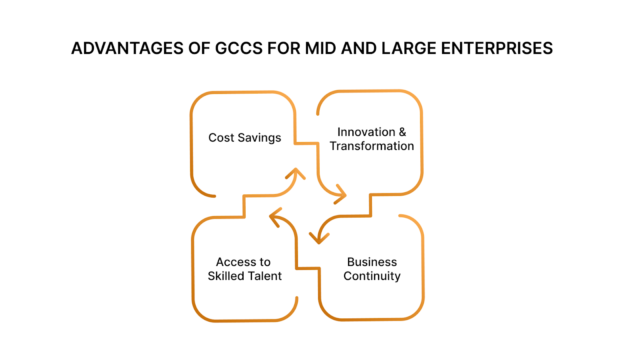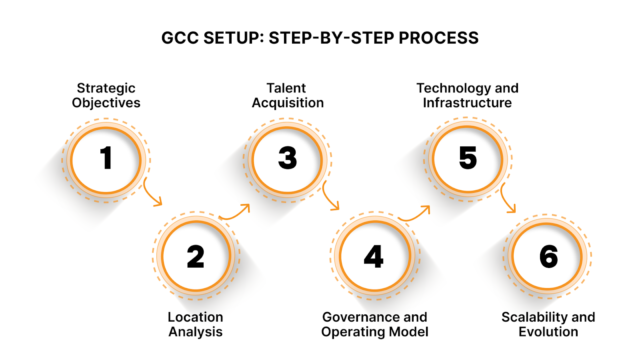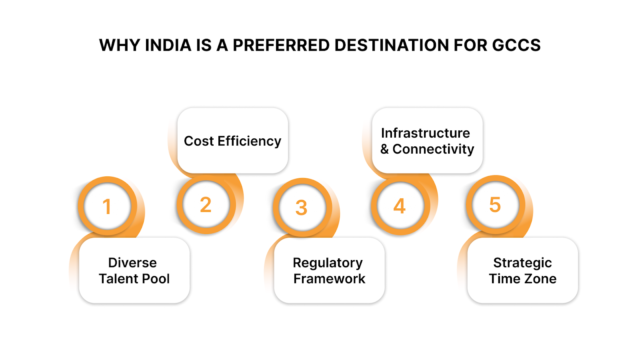Global Capability Centers (GCCs) are reshaping how multinational companies drive their operations, innovation, and talent strategy in India’s top business hubs. Major sectors, including tech, BFSI, and engineering, anchor their growth using GCCs, tapping into an extensive pool of skilled professionals.
India is seeing a record boom in GCC expansion, with over 1,900 centres leading enterprise transformation for leading brands.
For organisations aiming to scale fast and compete globally, understanding how GCC works is vital to building future-ready teams and unlocking business value in India’s dynamic market.
In a Nutshell:
- Global Capability Centres function as strategic hubs managing IT, finance, R&D, and shared services.
- India is the preferred GCC destination thanks to its skilled workforce, cost advantages, and strong city-level ecosystems.
- A structured setup covering objectives, location analysis, governance, and talent planning is essential for long-term success.
- V3 Staffing supports GCCs with SLA-driven recruitment solutions across permanent, IT, contract, RPO, and executive hiring.
What Is a GCC?
Before exploring the mechanics of how GCC works, it’s important to understand the concept itself. A Global Capability Centre (GCC), often referred to as a captive centre, is an offshore or nearshore unit that operates as an extension of its parent organisation.
Unlike outsourced models, GCCs remain fully owned and controlled by the enterprise, allowing greater visibility and strategic alignment.
GCCs typically:
- Manage critical business functions such as IT, finance, HR, analytics, customer support, and R&D.
- Serve as centres of excellence, combining operational efficiency with innovation.
- Provide companies with end-to-end control over compliance, security, and intellectual property.
India has emerged as the global leader in hosting GCCs, with thousands of centres established by Fortune 500 companies, product firms, and financial institutions. For Indian corporates as well as multinational firms with operations in India, the GCC model delivers both strategic and operational advantages.
Also Read: Types of Staffing and Their Differences
How GCC Works: Key Functions and Operations

At their core, GCCs operate as integrated business units that mirror the parent organisation’s priorities while adding local execution strength. They are not limited to back-office tasks but increasingly drive innovation, product development, and transformation initiatives.
The primary functions managed within GCCs include:
- Information Technology (IT): Software development, cloud engineering, cybersecurity, and digital transformation.
- Finance and Accounting: Transaction processing, compliance reporting, treasury, and financial analytics.
- Human Resources: Payroll, talent acquisition, employee engagement, and learning programmes.
- Customer Service: Multichannel support, customer experience, and service operations.
- Research & Development (R&D): Product design, prototyping, and market-specific innovations.
These operations are closely coordinated with the headquarters through governance structures, standard operating procedures, and advanced technology platforms. Effective talent management is equally important, as GCCs rely on a skilled workforce to deliver value across global teams.
Having understood the operations, let’s now look at the major advantages that GCCs bring to mid and large enterprises.
Advantages of GCCs for Mid and Large Enterprises

For mid-sized and large enterprises, GCCs act as strategic hubs that accelerate growth, resilience, and innovation. By understanding how GCC works in practice, businesses can unlock the following benefits:
- Cost Savings: Significant reduction in operational costs through consolidated functions, economies of scale, and access to India’s cost-effective talent market.
- Innovation and Transformation: GCCs evolve into centres of excellence, driving automation, product development, and digital-first initiatives for the parent organisation.
- Access to Skilled Talent: India’s deep pool of technology and domain experts in cities like Hyderabad, Bengaluru, Chennai, and Pune ensures global-standard delivery.
- Business Continuity and Control: Enterprises maintain full ownership of operations, ensuring compliance, security, and intellectual property protection.
These advantages position GCCs as powerful enablers for companies navigating global competition, regulatory shifts, and the need for faster innovation cycles.
Also Read: End-to-End Recruitment Process Explained
GCC Setup: Step-by-Step Process

Establishing a GCC requires a structured journey that blends strategy, compliance, and workforce expertise. The process typically involves the following stages:
-
Define Strategic Objectives
Clearly outline why the GCC is being set up, whether to reduce operational costs, enable 24/7 support, accelerate digital transformation, or establish a centre of excellence.
Enterprises that articulate goals upfront ensure stronger alignment between the GCC and the parent organisation.
-
Location Analysis
India offers a diverse set of GCC hubs, each with unique strengths.
- Hyderabad: Known for its cost advantages, availability of multilingual talent, and strong government support.
- Bengaluru: Global tech hub with deep IT and R&D expertise.
- Chennai & Pune: Strong in engineering, automotive, and finance capabilities.
- Delhi NCR & Mumbai: Ideal for BFSI, consulting, and corporate functions.
A thorough evaluation of infrastructure, talent density, and regulatory environment helps enterprises make informed choices.
-
Talent Acquisition
Building the right team is the backbone of a GCC. Companies need skilled professionals across IT, finance, HR, and operations, but talent competition is high.
Partnering with staffing experts like V3 Staffing ensures faster access to niche skill sets through multiple staffing methods.
-
Governance and Operating Model
Effective governance ensures that the GCC mirrors the parent organisation’s culture and standards. Defining KPIs, reporting structures, and communication channels is crucial for seamless collaboration.
-
Technology and Infrastructure
From secure cloud environments to AI-powered workflow tools, technology enables GCCs to stay integrated with global operations. Compliance with data security regulations (like GDPR or India’s DPDP Act) is also non-negotiable.
-
Scalability and Evolution
The most successful GCCs don’t remain static. They expand beyond support services into higher-value roles such as product innovation, AI/ML development, and analytics-driven decision-making.
In India, best practices highlight the importance of combining local expertise with global vision. With proven advisory and recruitment solutions, V3 Staffing enables enterprises to set up GCCs that are both compliant and competitive, from day one.
With the setup process mapped out, the next question is why India has become the preferred global destination for GCCs.
Why India Is a Preferred Destination for GCCs

India has established itself as a global hotspot for GCCs, attracting multinational and domestic enterprises alike. Several factors make the country an ideal choice for setting up and scaling captive centres:
- Deep and Diverse Talent Pool: India produces millions of graduates annually in IT, engineering, finance, analytics, and management disciplines.
- Cost Efficiency: Compared to Western markets, operating in India offers significant cost advantages, from salaries and infrastructure to vendor services, without compromising quality or productivity.
- Regulatory Framework and Ease of Doing Business: India’s evolving regulatory landscape supports foreign investment and company setup, with simplified compliance for tax, labour, and corporate laws. GCCs benefit from well-defined frameworks that facilitate smooth operations.
- Infrastructure and Connectivity: Major hubs provide world-class office spaces, technology parks, reliable connectivity, and supportive urban ecosystems for global talent mobility.
- Strategic Time Zone Advantage: Operating in India allows GCCs to provide extended coverage to clients in Europe, North America, and Asia-Pacific, enabling near-continuous business cycles.
By combining skilled talent, operational efficiency, and city-level strategic advantages, India continues to be the preferred destination for organisations looking to establish GCCs that are both high-performing and future-ready.
While India provides the ideal environment, the success of a GCC ultimately depends on having the right talent strategy in place, and that’s exactly where V3 Staffing comes into play..
V3 Staffing’s Role in GCC Talent Solutions
At V3 Staffing, we help enterprises build and scale high-performing GCCs in India by delivering the right talent at the right time. Our India-first approach ensures that your GCC functions efficiently across core business hubs.
Here’s how we support your GCC success:
- Permanent Recruitment: We source full-time professionals for mid-to-senior roles across IT, finance, HR, and shared services.
- IT Staffing: We connect you with niche technical talent, including cloud engineers, DevOps specialists, data scientists, software architects, and QA experts.
- RPO (Recruitment Process Outsourcing): We manage your end-to-end recruitment pipelines, embedding our team within your GCC operations to deliver results according to agreed SLAs.
- Contract/Temporary Staffing: We provide flexible, project-based workforce solutions to help you scale quickly without operational delays.
- Executive Search: We identify and secure leadership talent for CXO, VP, and Director roles, ensuring your GCC has strategic hires that drive growth.
We focus on delivering fast, reliable, and SLA-driven recruitment, allowing your GCC to concentrate on core business priorities while we handle talent acquisition, onboarding, and compliance.
Conclusion
Global Capability Centres have become strategic hubs for enterprises looking to consolidate operations, access specialised talent, and drive innovation.
V3 Staffing helps GCCs succeed by providing tailored workforce solutions. We work closely with you to overcome talent gaps, streamline hiring, and ensure SLA-driven delivery, so your GCC can focus on strategic growth and operational excellence.
Contact us to discuss how we can support your GCC in India and help you build a skilled, agile, and high-performing workforce.
FAQs
Q. How can GCCs in India improve hiring speed without compromising quality?
A. Many GCCs face delays in filling niche or senior roles. Partnering with specialised staffing firms like V3 Staffing helps accelerate recruitment through SLA-driven processes, curated talent pools, and domain-specific recruiters across IT, finance, and shared services.
Q. What workforce models are most effective for scaling a GCC in India?
A. Enterprises often adopt a mix of permanent recruitment for stability, contract staffing for peak demand, RPO for scalability, and executive search for leadership roles. The right model depends on the GCC’s stage of growth and industry focus.
Q. How do GCCs in hubs manage talent competition?
A. With multiple enterprises hiring in the same cities, competition for skilled professionals is intense. GCCs use tailored employer branding, flexible staffing models, and retention strategies supported by recruitment partners to stay ahead.
Q. What challenges do CHROs and TA leaders face when scaling GCC operations?
A. Typical challenges include high attrition, demand-supply gaps for niche tech skills, regulatory compliance, and maintaining offer-to-join ratios. These require dedicated recruitment engines, transparent dashboards, and continuous candidate engagement.
Q. Why should GCCs partner with a recruitment specialist instead of managing hiring in-house?
A. In-house teams often struggle with speed and specialised sourcing. Staffing partners bring industry expertise, established talent pipelines, and SLA-driven accountability, enabling GCCs to focus on core business priorities while securing the right workforce on time.




